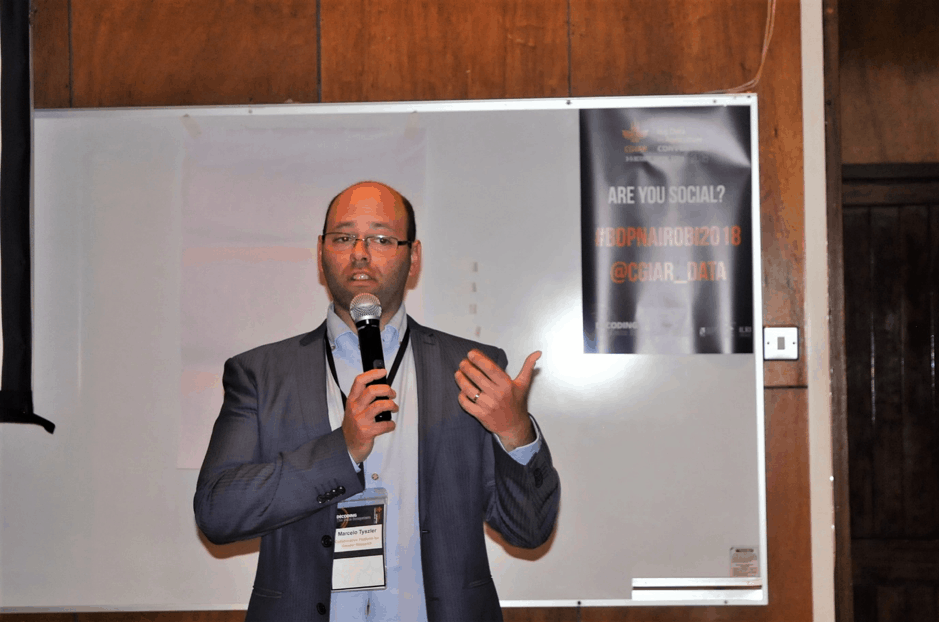To achieve gender SDGs gender data must be made visible
Achieving the United Nations Sustainable Development Goals (SDGs) requires integrated action on social, environmental, and economic challenges within all countries.

Marcelo Tyszler, Advisor on Sustainable Economic Development for the CGIAR Collaborative Platform for Gender Research, addresses a session on “Gender and the Data Ecosystem” at the 2018 CGIAR Big Data in Agriculture Convention.
According to a 2017 report from the UN Development Programme, the implementation of the SDGs also presents a strategic opportunity to build on the momentum of the data revolution to bring about a shift in the way governments, as well as the public and private sectors, use data and statistics.
At the 2018 CGIAR Big Data in Agriculture Convention, discussions around leveraging the data revolution for achieving the SDGs included a special focus on one of the goals: gender equality (SDG 5).
During a session on Gender and the Data Ecosystem, Marcelo Tyszler from the CGIAR Collaborative Platform for Gender Research discussed how Big Data (high volume, high velocity and ‘messy’ data) and Big Data analytical tools can unlock potential to understand gender research questions in food systems in new ways and at a scale that has rarely been done.
Marcelo added that the Gender Platform has been using the tools of Big Data for scalable, replicable research that can generate new insights and inform new interventions in order to build broad-based and socially-inclusive, resilient food systems worldwide. “This is in a bid to close the gender gap in agriculture, which is crucial to ensuring sustainable development,” added Marcelo.
During this session, Rianna Kelly from Groupe Speciale Mobile (GSM) elaborated on how technology is supporting scalable, commercial mobile solutions that impact smallholder farmers and the agricultural industry on a large scale. She said that the GSM Association (GSMA) has reduced the gender gap in mobile internet and mobile money services in low- and middle-income countries and unlocked significant commercial and socio-economic opportunities.
Speaking during his keynote address at the convention, Joe Mucheru, Kenya’s Cabinet Secretary for Information and Communication Technology, said that data ecosystems need political support, open data legislation, data infrastructure, and a popular demand for data in order to thrive.
In another high-level presentation, Tony Simons, the Director General of the World Agroforestry Centre, noted that it is also important to combine Big Data with big planning, quality, utility, management, and application. He concluded by saying that if Big Data does not account for women and youth then the data is not complete.
The Gender and the Data Ecosystem session with Tyszler and Kelly culminated with attendees writing down one research question for scalable, replicable research using Big Data related to gender that they would like to see tackled in 2019. Attendees also indicated how they see themselves getting involved in tackling this research question and whether they would like to be involved and contribute actively.
There is great potential for Big Data to generate new insights to inform policy interventions on the three pillars of sustainable development: economic, social, and environmental. Access to data has the potential to accelerate progress on the SDGs and radically improve service delivery, public administration, and accountability by governments and businesses. In particular, the use of data can be effective for achieving gender equality (SDG 5) and improving understanding of the dimensions of gender for Big Data in agriculture.
Grace Waithira
Youth in Data media delegate at Platform's 2018 convention and Communications Assistant at AWARD
This is one of a series of blogs written by one of our Youth in Data media delegates who participated in the 2nd Big Data in Agriculture Convention in Nairobi, Kenya on 3-5 October 2018.




